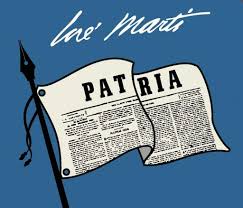
THE 130TH ANNIVERSARY OF THE NEWSPAPER "PATRIA" AND THE THIRTIETH ANNIVERSARY OF THE CELEBRATION OF THE PRESS DAY IN CUBA.
When the centenary of "Patria" was celebrated in 1992, the day of the press was celebrated for the first time in Cuba.
Since then, in the first fortnight of March, every year, various activities are held, including lectures, book presentations, as well as the delivery of the National Journalism Award "José Martí", for the work of life, and the Annual Award "Juan Gualberto Gómez" for the outstanding work done by journalists from different media and specialties.
Although since his youth José Martí began to dabble in journalism and also in different stages of his existence he created and directed some publications, it can be said that the newspaper "Patria", constituted his consecration as a journalist.
"Patria" was something strategic for Martí. It was not the organ of the Cuban Revolutionary Party in the first place because when this publication appeared, the founding of the Party had not yet been proclaimed, which happened almost a month later, exactly on April 10, 1892.
Martí conceived that the newspaper "Patria" would serve as a spokesman of the Cuban emigration and as an effective way to intensify the revolutionary propaganda campaign in favor of the struggle for the independence of Cuba and to contribute to that of Puerto Rico.
From the first issue of "Patria" through one of the works that Martí elaborated, the one titled "Our ideas", he patented: "To gather and love, and to live in the passion of the truth, this newspaper is born".
In that work Martí also made an analysis of the meaning that the resumption of the war in Cuba could have, and in this regard he said that it was not the case to wonder if it was desirable or not "since no pious soul could desire it, but to order it in such a way that it would propitiate republican peace and after it the upheavals to which the peoples of America who came into the world in years when political expertise and the employment of national force in work were not in the hands of all, as they are today, are neither justifiable nor necessary. "
In other works that came out both in this first issue of "Patria" and in successive editions, Martí dealt with the role of the Cuban Revolutionary Party, the preparations for the independence struggle and on the very significance and characteristics of the publication.
Likewise, in "Patria" Martí reflected portraits of outstanding figures of the struggle for the independence of Cuba, as was the case of Antonio Maceo, about whom he referred in a work published on October 6, 1893.
Precisely when making a comprehensive assessment of the brave independence fighter he said: "...and we must pay attention to what he says, because Maceo has as much strength in his mind as in his arm".
And he immediately added when summarizing in a brief but moving phrase what in his opinion Antonio Maceo could represent for the development of the cause of Cuban independence, beyond his contribution as a combatant and capable leader with weapons in hand: "With thought he will serve you, even more than with courage. Vigor and nature are natural to him."
Both in the course of 1892 and in the following two years in "Patria" José Martí continued publishing diverse materials that contributed a lot to spread the ideas related to the necessary struggle for the independence of Cuba.
In many of the works in "Patria" Martí also detailed principles that still have great significance and validity today, among them some that were related to the way human beings act.
It can be said that both in the newspaper "Patria" and in other publications, as well as in the speeches he delivered, José Martí proved to be someone who made a decisive contribution to the cause of Cuba's independence with the strength of his word as an essential weapon of combat.